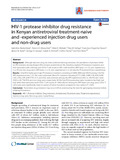HIV-1 protease inhibitor drug resistance in Kenyan antiretroviral treatment-naive and -experienced injection drug users and non-drug users

View/
Date
2015-08-15Author
Budambula, Valentine
Musumba, Francis O.
Webale, Mark K.
Kahiga, Titus M.
Owuor, Francisca Ongecha
Kiarie, James N.
Sowayi, George A.
Ahmed, Aabid A.
Ouma, Collins
Were, Tom
Metadata
Show full item recordAbstract
Background
Although injection drug use drives antiretroviral drug resistance, the prevalence of protease inhibitor (PI) resistance among Kenyan IDUs remains undetermined. We, therefore, explored PI resistance mutations and their association with viral load and CD4+ T cell counts in HIV-1 infected IDUs (ART-naive, n = 32; and -experienced, n = 47) and non-drug users (ART-naive, n = 21; and -experienced, n = 32) naive for PI treatment from coastal Kenya.
Results
Only IDUs harboured major PI resistance mutations consisting of L90M, M46I and D30 N among 3 (6.4 %) ART-experienced and 1 (3.1 %) -naive individuals. Minor PI mutations including A71T, G48E, G48R, I13V, K20I, K20R, L10I, L10V, L33F, L63P, T74S, V11I, and V32L were detected among the ART-experienced (36.2 vs. 46.9 %) and -naive (43.8 vs. 66.7 %) IDUs and non-drug users, respectively. All the four IDUs possessing major mutations had high viral load while three presented with CD4+ T cell counts of <500 cells/ml. Among the ART-naive non-drug users, CD4+ T cell counts were significantly lower in carriers of minor mutations compared to non-carriers (P < 0.05).
Conclusion
Transmitted drug resistance may occur in IDUs underscoring the need for genotyping resistance before initiating PI treatment.
URI
https://link.springer.com/article/10.1186/s12981-015-0070-y#Abs1https://doi.org/10.1186/s12981-015-0070-y
http://ir-library.mmust.ac.ke:8080/xmlui/handle/123456789/2371
Collections
- Gold Collection [969]
